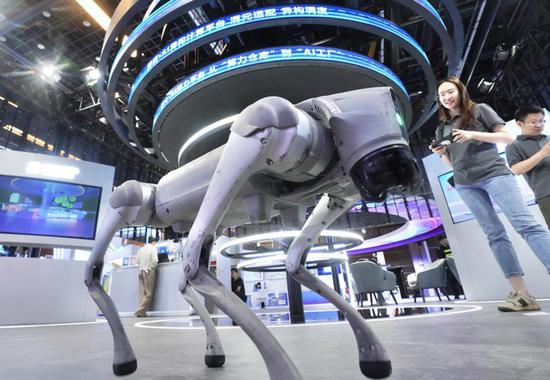
A robot dog is on display at the Global Digital Economy Conference 2024, which opened in Beijing on Tuesday. (Chen Gong/Courtesy of China Daily)
China will encourage companies and institutions to develop core technologies and breakthrough products in future-oriented and strategic emerging industries to promote industrial upgrading and foster new industrialization, the country's top industrial regulator said on Friday.
Minister of Industry and Information Technology Jin Zhuanglong said the country will accelerate efforts to develop future-oriented industries, especially humanoid robots, brain-computer interfaces, the metaverse, next-generation internet, 6G, quantum technology, atomic-scale manufacturing, deep sea and aerospace.
“In relation to the above future-oriented industries, we will carry out a series of research projects to make breakthroughs in core technologies, develop groundbreaking products and set up incubators,” Jin said at a press conference held by the State Council Information Office on Friday.
He said the government would also step up efforts to promote business in strategic emerging industries, which accounted for about 13 percent of China's GDP last year and have big growth potential in the future.
The official stressed the importance of several key strategic emerging industries, including new materials, artificial intelligence, intelligent connected new energy vehicles, new energy storage, hydrogen energy, bio-manufacturing, commercial aerospace and low-altitude economy.
“China will step up efforts to cultivate leading enterprises with strong ecosystems related to these strategic emerging industries, and strive to build more new pillar industries that can drive industrial upgrading,” he added.
In January, the Ministry of Industry and Information Technology, together with six other authorities and departments, issued guidelines urging the country to seize global opportunities in technological innovation and industrial development, particularly in six future directions: future manufacturing, future information, future materials, future energy, future space and future health.
The guidelines call for building a set of incubators and pilot zones for future-oriented industries by 2025 and achieving breakthroughs in around 100 core technologies in key sectors.
“Amid intensifying global competition and geopolitical uncertainty, it has become clearer that this year we can expect to see more intensified efforts to encourage companies to make breakthroughs in key technologies such as chips and overcome other technological bottlenecks,” said Hong Qunlian, a researcher at the National Development and Reform Commission's Institute of Macroeconomics.
“Without breakthroughs in these areas, it will be impossible to achieve industrial upgrading and stable industrial growth.”
China's industrial output – a measure of activity in the manufacturing, mining and utilities sectors – rose 5.6 percent in May from a year earlier, according to the National Bureau of Statistics.
Fixed asset investment, an indicator of spending on infrastructure, real estate, machinery and equipment, also increased 4% year-on-year in the first five months of the year.
Kim said on Friday the country will “further expand effective investment in manufacturing” and implement a detailed plan for equipment upgrading in the industrial sector to promote equipment renewal.
China is currently promoting the upgrading of industrial facilities and aims to increase industrial capital investment by more than 25% by 2027 compared to 2023.
“The state will also use funds such as the Manufacturing Transformation and Upgrading Fund, the Integrated Circuit Fund and the Small and Medium Enterprise Development Fund to invest more in manufacturing and guide social capital investment in some key areas and weak areas in the construction of a modern industrial system,” he added.
Investment in industrial equipment accounts for more than 70 percent of the country's total capital investment, with the annual scale of equipment replacement in the industrial sector being about 4 trillion yuan ($553 billion).
The country also aims to achieve a digitalization rate of more than 90 percent of research, development and design tools in key industrial enterprises, and the utilization rate of computer numerical control in key processes of more than 75 percent.
Strategic emerging industries and future-oriented industries will be the key areas for industrial upgrading under the new plan to develop high-quality productivity, analysts at Wanlian Securities said in a research note.
He also said that policies guiding large-scale equipment renewal will directly benefit the industrial equipment sector's high-end, intelligent and green trajectory.



